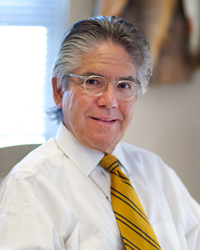

Supporting Clinical Research
The Office of Clinical Trials Makes Clinical Research Less Trying at Einstein and Montefiore
Often, the success of clinical research hinges on work that isn't clinical at all. Budgeting, contracting, and recruiting and enrolling subjects can make or break a study – and determine whether or not new knowledge is gained. Fortunately, Montefiore and Einstein investigators have a new resource to help them navigate the maze of administrative and accounting responsibilities that are part of any clinical study: the Office of Clinical Trials (OCT).

Dr. Barrett Katz, executive director of the OCTEstablished this summer with the Einstein-Montefiore Institute for Clinical and Translational Research (ICTR), the OCT provides resources to help ensure that trials are efficient and compliant with sponsor needs and regulatory guidelines. The office, staffed by a dedicated and experienced 10-person team, provides a "one-stop shop" for investigators where they can receive support with every aspect of managing pharmaceutical and medical device trials. Services include budget design and negotiation, contracting, subject recruitment and retention, invoicing, regulatory documentation, and data storage.
"We move the trial process forward," said OCT executive director Dr. Barrett Katz. "We are problem-solvers; we say, 'yes, we can'. In the past, investigators would have to navigate each step of the process on their own, without a roadmap. Now, we can make the process easier, more efficient and more successful."
Dr. Katz, a neuro-ophthalmologist by training who also has an M.B.A., takes the business of clinical trials seriously. He served as CEO of Danube Pharmaceuticals and chief medical officer of both Fovea Pharmaceuticals and Eyetech, which brought the first medical therapy for macular degeneration to market. Prior to that, he had a distinguished career in academia, most recently as professor and chair of ophthalmology at the George Washington University School of Medicine.
Efficiency and timeliness are especially important between what Dr. Katz calls "the idea stage" and the recruitment of a trial's first subject. Because accrual of patients must occur within a limited timeframe, the sooner a trial is activated, the more competitive Einstein and Montefiore, the University Hospital for Einstein, can be in attracting trials.
"Getting a trial up and running in three months rather than nine creates a longer runway for the investigator to succeed in meeting enrollment expectations," he explained.
The result: a successful trial and a better track record for us as a study site, generating more studies for us in the future. "Sponsors are looking for partners who are easy to deal with and successful in enrolling and retaining subjects; we want to be both", he added.

Dr. Golda Hudes meets with Alba Raghnauth to review the status of her clinical trial applicationThe creation of the OCT reinforces the commitment of Einstein and Montefiore in patient-oriented biomedical research, especially relevant to an urban setting in which efficiency of clinical research can have significant impact on health outcomes. By streamlining and re-engineering management of clinical trials, the OCT also increases the value of the Einstein and Montefiore enterprise to both investigators and trial sponsors, according to Dr. Katz. And that value attracts new trials, creating new opportunities for learning, discovery and advances in patient care.
"For many investigators-to-be, the match-making between an industry partner and a clinical faculty member can be a key first step," noted Dr. Harry Shamoon, director of the Einstein-Montefiore ICTR and associate dean for clinical and translational research at Einstein. "For others, it may be facilitating the contracting process, helping with institutional review board (IRB) submission or patient recruitment. Our joint ICTR enterprise supports research at both East and West campuses. We'll have a single portal for all researchers to use regardless of where they are based."
"The OCT is really about customer service," added Dr. Victor Hatcher, associate dean for continuing medical education and research administration. His office, which manages grant administration for Montefiore and other functions for Montefiore and Einstein, works closely with the OCT in what he called "a true partnership, a close synergy."
For those individual investigators who need it, the OCT also provides a link to the Biomedical Research Alliance of New York (BRANY), a consortium of academic medical centers that provides study support services. Additionally, the OCT assists investigators in submitting their work to the Einstein IRB, a unified IRB that now supports both Einstein and Montefiore. "Our experience has shown that many researchers and administrators have difficulty managing the business side of clinical trials, since they don't deal with such matters on a regular basis," said David Wallach, director of the IRB. "By centralizing these responsibilities in the OCT, we anticipate a smoother process for everyone. Having the IRB work closely with the OCT helps to ensure that industry research stays on track."
Dr. Golda Hudes, an associate professor who specializes in allergy and immunology, praises the OCT. "The OCT is focused on investigators," she said. "They provide a single, personal contact who keeps me updated on the status of approvals and deadlines, so I don't have to go looking for that sort of information. Without them, I'd have to keep track of all these details myself, so it's very helpful."

Members of the OCT staff gather for a meeting at the Moses Tower 8 office, its West campus location at Montefiore. The office is open Mondays, Wednesdays and Fridays, while the East campus office, in the Mazer building at Einstein, is open on Tuesdays and Thursdays.Another faculty member who has engaged the OCT is Dr. Steven Libutti, professor and vice-chair of surgery, professor of genetics, director of the Montefiore Einstein Center for Cancer Care and director of clinical services of the Albert Einstein Cancer Center. Cancer trials represent one of the largest clinical research programs within Einstein and Montefiore. "Having a central office for trials provides infrastructure that brings together researchers from both institutions more efficiently." "Together, both institutions are stronger," noted Dr. Libutti.
Dr. Katz agrees. "Both Einstein and Montefiore have a stake in this," he said, calling the OCT "a lucky marriage" and a true joint program begun between Einstein and Montefiore.
"Providing a mechanism to adopt and implement best practices is essential for us as we increase the scope and volume of clinical trials activity at our institution," said Dr. Brian Currie, vice president and medical director for research at Montefiore, and assistant dean for clinical research and professor of clinical medicine and of clinical epidemiology & population health at Einstein. "Now we have a partner with our ICTR that can teach others how to integrate innovative clinical trials into their institutional mission."
Ultimately, the "luckiest" beneficiary of the OCT will be patients, who will, have access to a greater number and variety of clinical trials, and whose care will benefit from the knowledge physicians gain in the future. "The OCT is a great example of our commitment to research, and our commitment to patients," said Dr. Libutti. "We owe that to them."
Posted on: Thursday, December 29, 2011

Tablet Blog